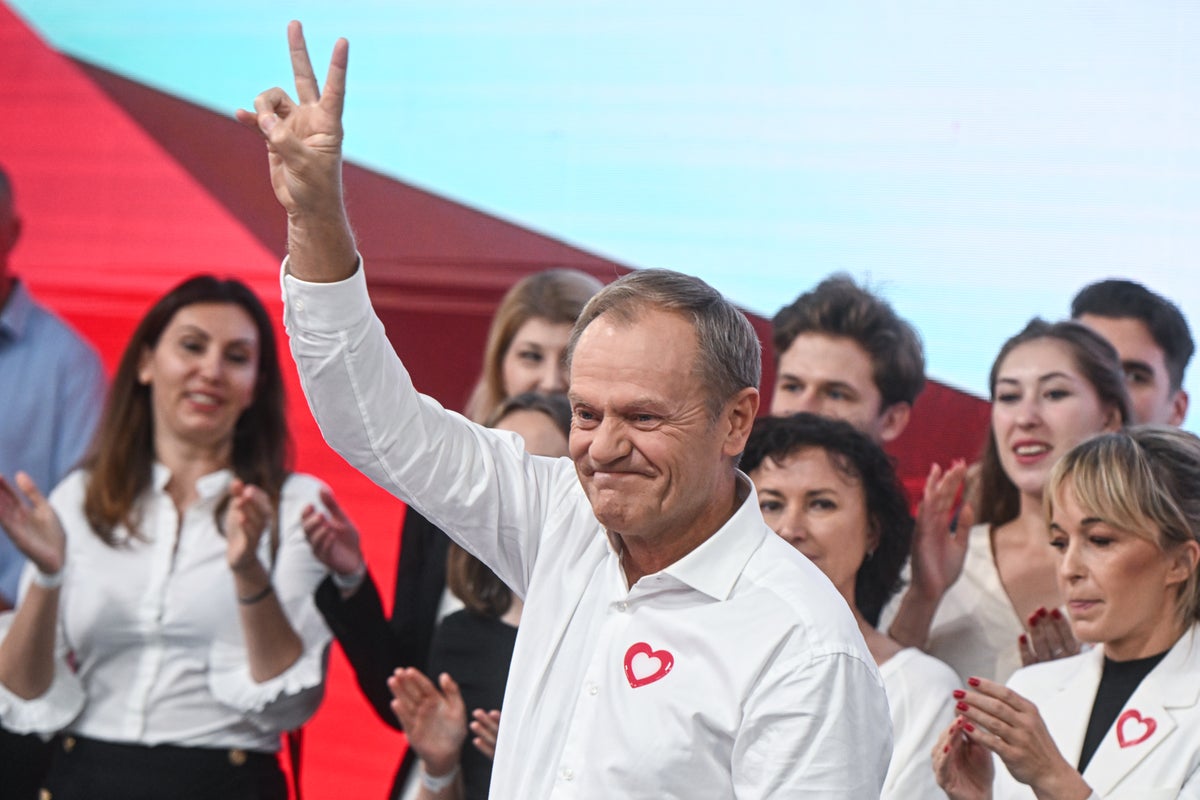
Donald Tusk hailed a new era for Poland after liberal, pro-EU opposition parties appeared poised to oust the governing conservative party in the nation’s most pivotal election in decades.
A late exit poll by Ipsos published on Monday afternoon gave the incumbent Law and Justice party (PiS) 36.1 per cent of the vote, which would translate into 196 seats in the lower house of parliament.
Opposition parties led by Mr Tusk’s liberal Civic Coalition (KO) were projected to win a combined 249 seats based on the highest turnout since the fall of communism in 1989. In Wroclaw, polling queues were so long that voting continued until nearly 3am.
PiS has repeatedly clashed with the EU over the rule of law, media freedom, migration and LGBT+ rights since it swept to power in 2015.
Voters waited for hours on Sunday amid high turnout, including at this polling station in Warsaw— (Getty)
KO, along with New Left and the centre-right Third Way, has pledged to mend ties with Brussels and scrap reforms they say have eroded Polish democracy.
Mr Tusk, a former prime minister and European Council president, told supporters: “Poland won. Democracy has won. We have removed them from power. I have been a politician for many years. I’m an athlete. Never in my life have I been so happy about taking second place.”
Polish financial markets surged on the prospect of a government led by Mr Tusk. The blue-chip WIG 20 share index was up 6.2 per cent at lunchtime, while the zloty, Poland’s currency, was 1.3 per cent stronger.
Jaroslaw Kaczynski, the leader of Poland’s ruling conservative Law and Justice party— (Reuters)
But even if the exit polls prove accurate, Mr Tusk and his allies may have to wait weeks or even months before getting a turn at forming a government.
Poland’s president, Andrzej Duda, a PiS ally, has said he will give the winning party the first chance at forming a coalition. PiS has won more votes than any other single party, according to the polls, and said it would try to build a new government led by prime minister Mateusz Morawiecki.
But the leader of the agrarian PSL party, a frequent kingmaker in past governments, ruled out cooperating with PiS after running with the Third Way coalition. “Those who voted for us want change, want a change of government, want PiS removed from power,” said Wladyslaw Kosiniak-Kamysz.
A man checks the results of Sunday’s parliamentary elections in Poland— (AP)
The Organisation for Security and Cooperation in Europe (OSCE) said Poland’s election had not been entirely free and fair. “The ruling party enjoyed a clear advantage through its undue influence over the use of state resources and public media,” said Pia Kauma, head of the OSCE Parliamentary Assembly.
Turnout among 18- to 29-year-olds jumped to 71 per cent from 46 per cent in the last parliamentary election in 2019, according to Ipsos.
In an aggressive campaign, PiS had cast the election as a choice between, on one hand, uncontrolled illegal migration under the rule of leaders it said were beholden to foreign interests, and on the other, a government that would protect Poland’s borders and traditions.
However, PiS faced accusations of democratic backsliding and undermining women’s rights after the government enforced a near-total ban on abortion in 2021.
A man prepares his ballot in Warsaw on Sunday— (AP)
PiS was also accused of using lucrative positions in state-controlled companies to reward supporters.
“I expect that women will now have more rights, that they will feel safer,” said Iga Frackiewicz, 43, a banking administrator. “I also hope that nepotism will end, for example in state companies and in other places.”
The outcome could also affect ties with neighbouring Ukraine, which Poland has been supporting in the war against Russia’s aggression. Good relations between the two countries soured in September over the question of Ukrainian grain entering and affecting Poland’s market.







